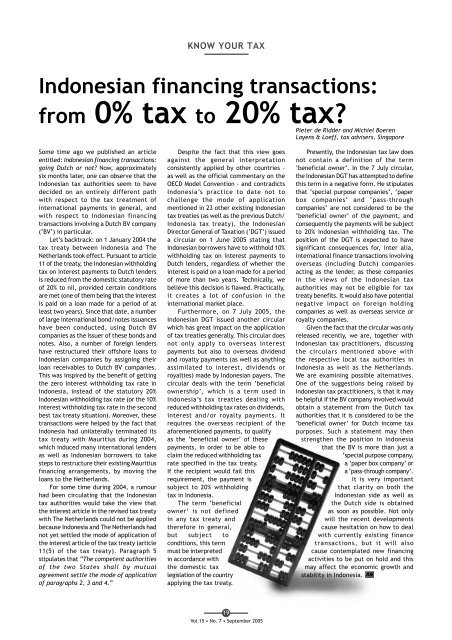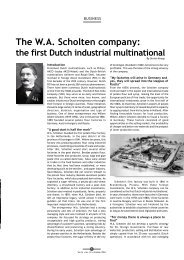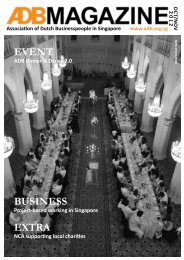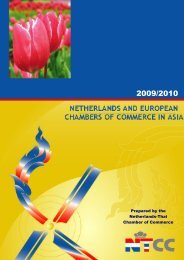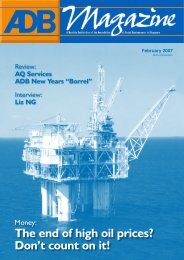Sept 2005 - Association of Dutch Businessmen
Sept 2005 - Association of Dutch Businessmen
Sept 2005 - Association of Dutch Businessmen
You also want an ePaper? Increase the reach of your titles
YUMPU automatically turns print PDFs into web optimized ePapers that Google loves.
KNOW YOUR TAX<br />
Indonesian financing transactions:<br />
from 0% tax to 20% tax?<br />
Pieter de Ridder and Michiel Boeren<br />
Loyens & Loeff, tax advisers, Singapore<br />
Some time ago we published an article<br />
entitled: Indonesian financing transactions:<br />
going <strong>Dutch</strong> or not? Now, approximately<br />
six months later, one can observe that the<br />
Indonesian tax authorities seem to have<br />
decided on an entirely different path<br />
with respect to the tax treatment <strong>of</strong><br />
international payments in general, and<br />
with respect to Indonesian financing<br />
transactions involving a <strong>Dutch</strong> BV company<br />
(‘BV’) in particular.<br />
Let’s backtrack: on 1 January 2004 the<br />
tax treaty between Indonesia and The<br />
Netherlands took effect. Pursuant to article<br />
11 <strong>of</strong> the treaty, the Indonesian withholding<br />
tax on interest payments to <strong>Dutch</strong> lenders<br />
is reduced from the domestic statutory rate<br />
<strong>of</strong> 20% to nil, provided certain conditions<br />
are met (one <strong>of</strong> them being that the interest<br />
is paid on a loan made for a period <strong>of</strong> at<br />
least two years). Since that date, a number<br />
<strong>of</strong> large international bond/notes issuances<br />
have been conducted, using <strong>Dutch</strong> BV<br />
companies as the issuer <strong>of</strong> these bonds and<br />
notes. Also, a number <strong>of</strong> foreign lenders<br />
have restructured their <strong>of</strong>fshore loans to<br />
Indonesian companies by assigning their<br />
loan receivables to <strong>Dutch</strong> BV companies.<br />
This was inspired by the benefit <strong>of</strong> getting<br />
the zero interest withholding tax rate in<br />
Indonesia, instead <strong>of</strong> the statutory 20%<br />
Indonesian withholding tax rate (or the 10%<br />
interest withholding tax rate in the second<br />
best tax treaty situation). Moreover, these<br />
transactions were helped by the fact that<br />
Indonesia had unilaterally terminated its<br />
tax treaty with Mauritius during 2004,<br />
which induced many international lenders<br />
as well as Indonesian borrowers to take<br />
steps to restructure their existing Mauritius<br />
financing arrangements, by moving the<br />
loans to the Netherlands.<br />
For some time during 2004, a rumour<br />
had been circulating that the Indonesian<br />
tax authorities would take the view that<br />
the interest article in the revised tax treaty<br />
with The Netherlands could not be applied<br />
because Indonesia and The Netherlands had<br />
not yet settled the mode <strong>of</strong> application <strong>of</strong><br />
the interest article <strong>of</strong> the tax treaty (article<br />
11(5) <strong>of</strong> the tax treaty). Paragraph 5<br />
stipulates that “The competent authorities<br />
<strong>of</strong> the two States shall by mutual<br />
agreement settle the mode <strong>of</strong> application<br />
<strong>of</strong> paragraphs 2, 3 and 4.”<br />
Despite the fact that this view goes<br />
against the general interpretation<br />
consistently applied by other countries -<br />
as well as the <strong>of</strong>ficial commentary on the<br />
OECD Model Convention - and contradicts<br />
Indonesia’s practice to date not to<br />
challenge the mode <strong>of</strong> application<br />
mentioned in 23 other existing Indonesian<br />
tax treaties (as well as the previous <strong>Dutch</strong>/<br />
Indonesia tax treaty), the Indonesian<br />
Director General <strong>of</strong> Taxation (‘DGT’) issued<br />
a circular on 1 June <strong>2005</strong> stating that<br />
Indonesian borrowers have to withhold 10%<br />
withholding tax on interest payments to<br />
<strong>Dutch</strong> lenders, regardless <strong>of</strong> whether the<br />
interest is paid on a loan made for a period<br />
<strong>of</strong> more than two years. Technically, we<br />
believe this decision is flawed. Practically,<br />
it creates a lot <strong>of</strong> confusion in the<br />
international market place.<br />
Furthermore, on 7 July <strong>2005</strong>, the<br />
Indonesian DGT issued another circular<br />
which has great impact on the application<br />
<strong>of</strong> tax treaties generally. This circular does<br />
not only apply to overseas interest<br />
payments but also to overseas dividend<br />
and royalty payments (as well as anything<br />
assimilated to interest, dividends or<br />
royalties) made by Indonesian payers. The<br />
circular deals with the term ‘beneficial<br />
ownership’, which is a term used in<br />
Indonesia’s tax treaties dealing with<br />
reduced withholding tax rates on dividends,<br />
interest and/or royalty payments. It<br />
requires the overseas recipient <strong>of</strong> the<br />
aforementioned payments, to qualify<br />
as the ‘beneficial owner’ <strong>of</strong> these<br />
payments, in order to be able to<br />
claim the reduced withholding tax<br />
rate specified in the tax treaty.<br />
If the recipient would fail this<br />
requirement, the payment is<br />
subject to 20% withholding<br />
tax in Indonesia.<br />
The term ‘beneficial<br />
owner’ is not defined<br />
in any tax treaty and<br />
therefore in general,<br />
but subject to<br />
conditions, this term<br />
must be interpreted<br />
in accordance with<br />
the domestic tax<br />
legislation <strong>of</strong> the country<br />
applying the tax treaty.<br />
Presently, the Indonesian tax law does<br />
not contain a definition <strong>of</strong> the term<br />
‘beneficial owner’. In the 7 July circular,<br />
the Indonesian DGT has attempted to define<br />
this term in a negative form. He stipulates<br />
that ‘special purpose companies’, ‘paper<br />
box companies’ and ‘pass-through<br />
companies’ are not considered to be the<br />
‘beneficial owner’ <strong>of</strong> the payment, and<br />
consequently the payments will be subject<br />
to 20% Indonesian withholding tax. The<br />
position <strong>of</strong> the DGT is expected to have<br />
significant consequences for, inter alia,<br />
international finance transactions involving<br />
overseas (including <strong>Dutch</strong>) companies<br />
acting as the lender, as these companies<br />
in the views <strong>of</strong> the Indonesian tax<br />
authorities may not be eligible for tax<br />
treaty benefits. It would also have potential<br />
negative impact on foreign holding<br />
companies as well as overseas service or<br />
royalty companies.<br />
Given the fact that the circular was only<br />
released recently, we are, together with<br />
Indonesian tax practitioners, discussing<br />
the circulars mentioned above with<br />
the respective local tax authorities in<br />
Indonesia as well as the Netherlands.<br />
We are examining possible alternatives.<br />
One <strong>of</strong> the suggestions being raised by<br />
Indonesian tax practitioners, is that it may<br />
be helpful if the BV company involved would<br />
obtain a statement from the <strong>Dutch</strong> tax<br />
authorities that it is considered to be the<br />
‘beneficial owner’ for <strong>Dutch</strong> income tax<br />
purposes. Such a statement may then<br />
strengthen the position in Indonesia<br />
that the BV is more than just a<br />
‘special purpose company,<br />
a ‘paper box company’ or<br />
a ‘pass-through company’.<br />
It is very important<br />
that clarity on both the<br />
Indonesian side as well as<br />
the <strong>Dutch</strong> side is obtained<br />
as soon as possible. Not only<br />
will the recent developments<br />
cause hesitation on how to deal<br />
with currently existing finance<br />
transactions, but it will also<br />
cause contemplated new financing<br />
activities to be put on hold and this<br />
may affect the economic growth and<br />
stability in Indonesia.<br />
19<br />
Vol.15 • No. 7 • <strong>Sept</strong>ember <strong>2005</strong>


